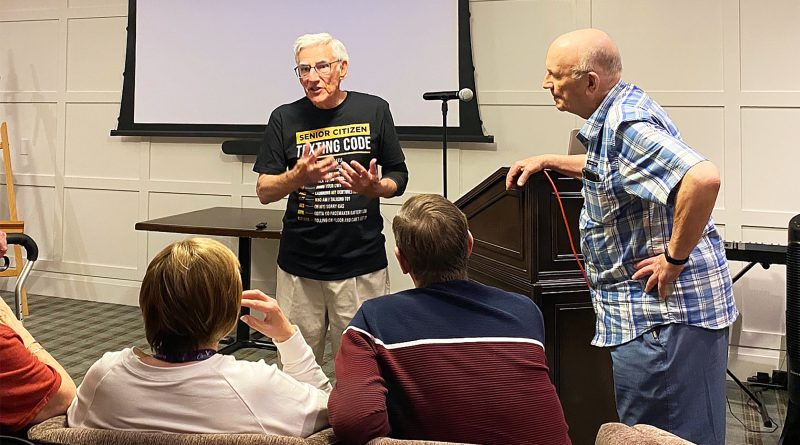Longworth talks AI at Carp Commons
By Nonie Smart - West Carleton Online
CARP – “I ride a wave of optimism mapping a course toward a horizon where the perks of Artificial Intelligence (AI) unfold,” wrote Richard Longworth at the beginning of this year.
Last week (July 5) the longtime West Carleton Online online resources columnist shared his enthusiasm for this emerging technology with residents of Carp Commons. As seniors gathered for the presentation Stephanie Fichera, Carp Commons life enrichment manager said she was expecting 40 residents to take part.
Longworth says he developed an interest in AI and all it can offer a few years ago.
“Like the first introduction of the Internet,” he said, “you need to be aware of its immense potential.”
He believes seniors could also benefit in many ways by tapping into the power of AI.
“I am trying to help out the community,” he said. “My aim with this presentation is to educate, demonstrate and encourage the use of AI for seniors. I want to highlight the possibilities of AI to enhance our daily lives while ensuring there is an ethical and informed approach to its adoption. I would not be doing this if it wasn’t ethical or if I didn’t feel it was right.”
“My background is in technology,” he told the packed audience of the Carp Commons theatre. “And I want to use my skills for a purpose. As a member of the Center for Humane Technology (CHT), I share their goal the use of AI must be purposeful, useful and humane so it will be just like any new technology and will benefit man and womankind.”
Longworth used a few analogies to illustrate the concepts of AI for the new user.
“First,” he said. “In order to reach ‘AI land’, think of yourself as boarding a transporter like taking a virtual bus or train. In this case we will use a piece of software called ChatGPT to connect us with AI.”
While it might seem overwhelming at first to learn about and use ChatGPT, Longworth says it’s really the same as learning any new skill.
“Take woodworking for example, at first the tools might seem complex but with practice it will become easier,” Longworth said. “Then, with time, working with the tools becomes second nature and so you are producing amazing creations. It’s the same with AI as soon as we understand the technology it’s a tool and we can do all sorts of things with it.”
You could look at ChatGPT as an assistant who can help you with many things says Longworth as the following examples illustrate.
“Betty, a 78-year-old, loves bingo but sometimes struggles to remember the bingo patterns,” he said. “So, every week she asks ChatGPT for bingo tips and reminders of bingo games in the community. That’s what it can do for you. One day she asked ChatGPT to call out random numbers so she could practice. It was then she realized she had her own bingo caller and she could do this by herself.”
This second example gives a different perspective of the potentially infinite ChatGPT capabilities.
“Last week I took a picture of a mole on my face,” said Longworth, “I asked ChatGPT, “Is it cancerous, what do you recommend?” Amazingly it came back with a diagnosis. I then went to see the nurse practitioner, over here at the medical center and they gave the same diagnosis exactly almost word for word. So I used ChatGPT in this case for health reasons.”
For starters Longworth suggests new users not worry about the complex details of AI technology but to simply think of ChatGPT as a smart assistant that is activated by a prompt.
“AI is a situation where you have an assistant working with you in the room,” he said. “You might ask something like, ‘Tell me the rules about the game of pool.’ In general, it explains to you things you would like to know and learn. That is all it is. We prompt with a question.”
Prompts for AI are either simple or complex depending on the detail required in the answer. While simple prompts are something anyone can do, Longworth says a more complex prompt, should be left to a prompt engineer; someone with specific computer programming skills.
“Prompt engineering is required for complex prompts,” he said. “You could think of this as designing a ChatGPT ‘with high qualifications,’” he said. “For example, I developed a specific ChatGPT for the Dave Smith Youth Treatment Centre whom I have been working with. They told me they were having trouble filling in when the psychiatrist/psychologist was not available during the night. So what I have done is trained a ChatGPT to act as a psychiatrist/psychologist resource for their patient demographic. It took me three months to design a complex ChatGPT. When I had it tested at the University of Ottawa they told me it functions at the intern level of a psychotherapist; someone who has just graduated from psychiatric studies at this university. This ChatGPT is not being used at the moment but I share this as an example of what might be involved when creating a complex prompt.”
It has been more than 60 years since the term AI was introduced. In 1956, Marvin Minsky envisioned AI as a technology that would enable machines to mimic human intelligence. Since that time AI has been improved by sequentially upgrading the mathematical models that enable AI software to predict the next word in a sentence based on the previous word. Over the decades the software has been trained on billions of sentences as explained in this video.
Currently AI is only able to perform only one human task at a time but futurists speculate the day will come where AI will be able to do many different tasks at once just like a human mind. In the meantime many believe, including Longworth, the use of AI could make a real difference in the lives of older adults. The video Empowering Seniors With ChatGPT 10 Ways its Transforming Elder Care is just one educational resource that illustrates how AI might be used to support the social, physical and mental health of seniors.
The key to getting the information you want says Longworth is to provide a good prompt and also to train ChatGPT to give good responses. That is where he thinks he could really help seniors to get the most benefit from using AI.
“At first it won’t always give you the best answer,” he said. “If it gives a wrong answer we call that a ‘hallucination.’ So ChatGPT could give back false information but eventually it will give you the best information once you know how to train it. For example, if you were to ask ChatGPT to figure out the values of a, b, c in an algebra problem it might have trouble with that. But, if you add to your question, ‘the response you will give me is based on an algebra expert who has taught at the high school level.’ It would respond based on that instruction. You have told ChatGPT where to get the answer.”
In responding to a question from the front row, Longworth explained what would happen if ChatGPT was prompted to make a prediction such as who might win an election.
“So let’s say you prompt with, ‘who will win the 2024 presidential election?’” he said. “Yes it will come back with an answer. It will go out into the web and survey probably 10,000 or 100,000 articles and do a summary of those articles and come up with a prediction based on that survey. Will that be correct? Not necessarily. It’s just a prediction based on its research. And all of this will take a few minutes or less. You can ask ChatGPT what research it did. It’s not uncommon for it to say ‘I have analyzed 50,000 papers on a given topic.’ It can do this in minutes or less, what would take days or longer for a person to do.”
Longworth has developed his own format for creating a simple prompt which he calls ‘COSTAR’ an acronym based on the first letter of each of the six elements he feels should be included for an effective prompt. He uses the following example in which a user is seeking information pertaining to the automotive industry.
- Context – the increasing popularity of electric vehicles
- Objective – explain how electric vehicles compare to traditional vehicles
- Style – informative
- Tone –neutral
- Audience – general
- Response – summarized list
Longworth would like to help integrate AI into the daily lives of seniors living at Carp Commons. To that end West Carleton Online learned he has already proposed a four step plan to set the wheels in motion.
“This is just the beginning,” he says, “I’m confident there are many ideas to be explored. I propose we start by conducting a survey to determine individual needs. From this we can create simple prompts using the COSTAR concepts I have developed, then that can be adapted for individual use. Once we have implemented a plan we can monitor and use feedback to improve user experience.”
In the meantime, says Longworth why not give ChatGPT a whirl in three easy steps. Start by typing chatgpt.com into your browser, add your prompt into the Message ChatGPT text box and hit return.













I’ve avoided trying Chatgpt because of the stink it has raised amongst authors and writers who claim that it has stolen their work and used it for free to train the AI bot.